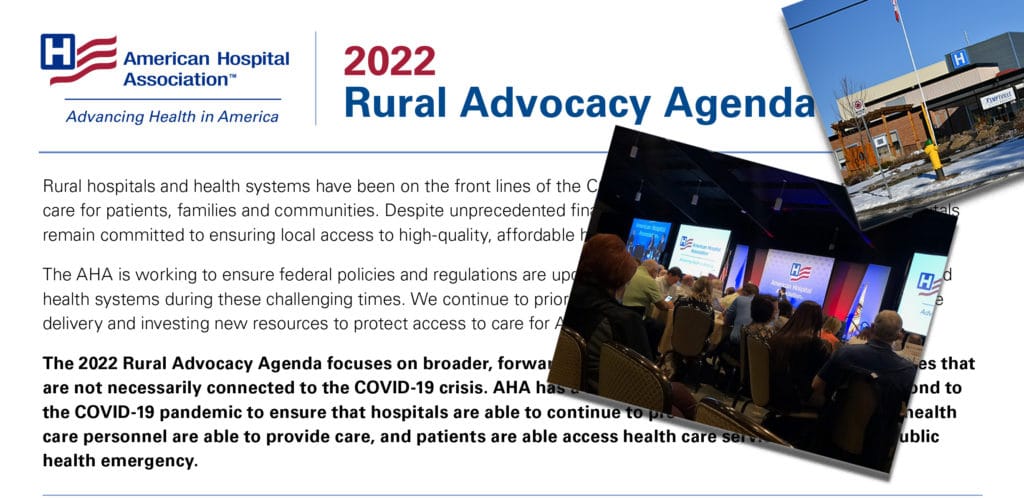The American Hospital Association (AHA) updated rural hospital leaders regarding its 2022 Rural Advocacy Agenda during the recent AHA Rural Health Care Leadership Conference in Phoenix, AZ, attended by AppriseMD CEO Franklin E Baumann, MD.
“The 2022 Rural Advocacy Agenda focuses on broader, forward-looking legislative and regulatory priorities that are not necessarily connected to the COVID-19 crisis,” AHA stated in its report. The agenda aims to help keep more rural hospitals open and financially solvent. The AHA’s urging of Congress to act on legislation that could help support flexible payment options for rural hospitals is critical to keeping these care facilities open. Critical access hospitals (CAHs) are small rural hospitals designed by the Centers for Medicare & Medicaid Services (CMS) to receive a higher rate of reimbursement for services based on the actual costs of services rather than reduced Medicare fees. This is done in order to help keep these facilities open and viable. Hospitals must meet certain criteria to qualify as a CAH. AHA is urging Congress to reopen the “Necessary Provider Designation” for hospitals who do not meet the CAH’s mileage requirement. This could help hospitals such as Iroquois Memorial Hospital in Watseka, Illinois, which misses the CAH mileage requirement by roughly a mile. About an hour and a half outside of Chicago, this hospital serves a population of 4,679 with a median annual household income of just under $40,000, according to the U.S. Census Bureau.
“Keeping small rural hospitals not only open, but also financially heathy, is a must for rural communities,” Dr. Baumann stated.
AHA’s agenda aims to “ensure fair and adequate reimbursement” for rural hospitals and one example of that is its support for “legislation to streamline and improve prior authorization processes, which would help providers spend more time on patients instead of paperwork (H.R. 3173/S. 3018).” Such action would help decrease the number of admission denials rural hospitals face, especially at a time when many may not have the workforce to deal with refuting denials through such processes as Peer-to-Peer reviews. Providers often don’t want to or don’t have time to conduct reviews of denials and, as a result, are reimbursed for a lower level of care (meaning a lower price) putting further strain on their budgets.
“We have seen countless examples of questionable and often blatantly incorrect denials resulting in significant hits to hospital revenue,” Dr. Baumann added.
Another critical piece of legislation AHA is pushing would permanently remove the 96-hour physician certification requirement for CAHs. According to CMS, “An individual may remain a CAH inpatient for more than 96 hours. However, if the physician can’t certify at the time of admission that the individual is expected to be discharged or transferred to a hospital within 96 hours, the CAH won’t get payment for the inpatient service.” (CMS Medical Learning Network Booklet Critical Access Hospital pg.6). In its advocacy to remove the 96-hour physician certification requirement, AHA states, “these hospitals still would be required to satisfy the condition of participation requiring a 96-hour annual average length of stay but removing the physician certification requirement would allow CAHs to serve patients needing critical medical services that have standard lengths of stay greater than 96 hours.”
AppriseMD strongly supports these AHA initiatives and the advocacy work to keep rural hospitals open and solvent for the communities they serve.
Read AHA’s full agenda to see more about their work to support connected care, bolster the rural health care workforce and reign in prescription drug prices.

